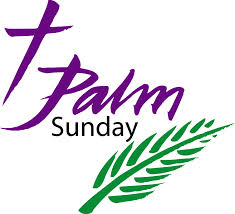Passion Sunday of the Lord’s Passion: No need for the Temple
There are many scenes in the Passion account from the Gospel of Matthew which we have just proclaimed. This year, a particular scene keeps recurring to me.
Apr 10, 2014

Palm Sunday of the Lord’s Passion (Year A)
At The Procession With Palms: Matthew 21:1-11
Readings: Isaiah 50:4-7;
Philippians 2:6-11
Gospel: Matthew 26:14-27:66
There are many scenes in the Passion account from the Gospel of Matthew which we have just proclaimed. This year, a particular scene keeps recurring to me. The scene is not on Golgotha, but in Jerusalem, in the Temple. The time in at 3 in the afternoon at the moment that Jesus dies. The readings said that there was an earthquake, and the curtain of the Temple was torn in two.
What was this curtain, and how is its tearing significant? The curtain was the barrier between the Holy of Holies representing where God dwelt and the rest of the Temple representing where man dwelt. When Jesus died on the Cross, the barrier between God and man was destroyed. The Holy of Holies was also the place of the major sacrifices of the year, mostly slaughtered animals. There would no longer be a reason for man to make burnt offerings. Jesus’ sacrifice made these types of sacrifices absurd. In fact, there would no longer be a need for a Temple. For now, God’s People, united to Christ, would be the Temple.
The Passion reading began with Jesus proclaiming a new covenant that was being made between God and man, a covenant of blood made by His sacrifice.It is easy to get caught up in the emotions of Passion Sunday and of Good Friday. We want to feel sorry for Jesus suffering as He did. But He does not want our sympathy. He wants our union with Him in a world transformed by His Love, sacrificial love. He wants our fidelity to the New Covenant.
So this week, Holy Week, we focus on our sharing in the Blood of the New Covenant, our sharing in the sacrifice that formed a new temple, our place in the People of God. (At this point the homilist can point out the times of the Triduum celebrations.What follows are the times for my parish, St. Ignatius.) Come and join us on Thursday evening as we celebrate the solemn Mass of the Lord’s Supper at 7:00 pm. Join us in consuming and being consumed by the Eucharist. Good Friday is the most solemn day of the year, a day of fasting and abstinence, a day of prayer. Cancel any plans to treat this as a day off from work or school. Come and join us at 3:00 pm for the Liturgy of the Veneration of the Cross. Join us as we unite our pains, fears, and suffering to the cross, sacrificing all for the Kingdom of God. The Tree of the Cross is a Tree of Life, not a tree of death. For on Easter Sunday, the fruit of the cross is the Life of the Lord, given to the world in general and to each of us in particular at our baptism. Come and join us for the Solemn Easter Vigil and first Easter Mass at 8:00 pm next Saturday, or join us at one of the Masses on Easter Sunday morning as we celebrate the Life that makes all life worth living.
I pray that you and your families may have a Holy Week.--By Fr Joseph A Pellegrino
Thoughts of the Early Church
Blessed is he who comes in the name of the Lord.
Because of all he had done, the simple people believed in the Lord not only with a silent faith, but with a faith that proclaimed his divinity both by word and by deed.
After raising Lazarus, who had been dead four days, the Lord found the young donkey his disciples had brought for him, as the evangelist Matthew relates.
Seated on it he entered Jerusalem, in fulfillment of the prophecy of Zechariah: “Fear not, daughter of Zion; behold your king comes to you, the just one, the saviour. He is gentle, and rides on a beast of burden, on the colt of a donkey.”
By these words the Prophet shows that Christ was the king he was foretelling, the only true king of Zion. He is saying:
“Your king will not frighten those who look upon him; he is not an overbearing kind of person, or an evildoer.
He does not come with a bodyguard, an armed escort, at the head of hosts of cavalry and foot soldiers.
Nor does he live by extortion, demanding taxes and the payment of tribute and ignoble services, hurtful to those who perform them.
No, he is recognized by his lowliness, poverty, and frugality, for he enters the city riding on a donkey, and with no crowd of attendants.
Therefore, this king alone is just, and in justice he saves. He is also meek, meekness is his own special characteristic.
In fact, the Lord’s own words regarding himself were: “Learn from me, for I am meek and lowly in heart.”
He who raised Lazarus from the dead enters Jerusalem today as king, seated on a donkey. Almost at once all the people, children and grown-ups, young and old alike, spread their garments on the road; and taking palm branches, symbols of victory, they went to meet him as the giver of life and conqueror of death.
They worshipped him, and formed an escort. Within the temple precincts as well as without they sang with one voice, “Hosanna to the Son of David! Hosanna in the highest!” This hosanna is a hymn of praise addressed to God.
It means, “Lord, save us.” The other words, “in the highest,” show that God is praised not only on earth by human beings, but also on high by the angels of heaven. -- Gregory Palamas (1296-1359)







Total Comments:0